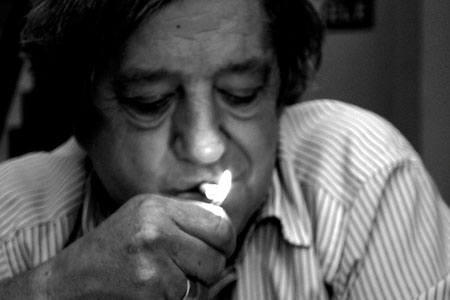Via Movie City News comes word that director, actor, professor, and all-round cineaste Jean-Henri Roger died on the last day of 2012 at the age of 63. As noted in reports from the AFP and Les Inrocks as well as in the French Wikipedia entry, Roger was born in Marsailles to militant communist parents and took an early interest in Maoism. He wrote for the leftist paper La Cause du Peuple, many of whose editors would eventually found Libération, the less radical but nonetheless leftish daily. In short, he was a prime candidate for the Dziga Vertov Group, the filmmaking collective that defied the notion of personal authorship, though it can never go unmentioned that its most well-known founders were Jean-Luc Godard and Jean-Pierre Gorin.
Richard Brody in Everything Is Cinema: The Working Life of Jean-Luc Godard:
In September 1968, Godard had invited the twenty-year-old Jean-Henri Roger, from the militant newspaper Action, to work with him. As Roger recalled, Godard intended “to break with his practice as a filmmaker—never to do things as he had done them before—and to join politics and aesthetics.” [Anne] Wiazemsky had less faith in Roger’s contribution. Of his “arrival” she said: “Jean-Luc was in awe of him, whereas in my opinion his discourse was prefabricated. He crashed at our house; he took us for his mother and father.”
Godard and Roger had coffee together almost every morning at the café La Favorite on the boulevard St.-Michel, close to Godard and Wiazemsky’s apartment on the rue St.-Jacques. Up to that point, Wiazemsky recalled, Godard, despite his increasing distance from conventional cinematic practice, frequently went with her to the movies, listened to music, and read books, but then “politics took the place of literature, of music, thanks to Jean-Henri Roger.” When, in early 1969, Godard started work on another film—one even more aridly doctrinaire than the fictional scenes of One Plus One or the narration of A Film Like the Others—Roger joined Godard on location.
That film was British Sounds, which, according to Jonathan Dawson in Senses of Cinema, “is, in one sense, a very long lecture (or harangue) by two filmmakers that is almost the purest example of agitprop in modern cinematic history.” Pravda (1970) followed. Ed Howard: “Filmed in Czechoslovakia in the wake of the Soviet invasion of the country, with the assistance of DVG collaborator Jean-Henri Roger, Pravda is a savagely sarcastic indictment of the Soviets, the Czechs, and what Godard considered ‘pseudo-Communists’ everywhere.”
In 1981, Roger collaborated with Juliet Berto on Neige (Snow), which shared an award for Contemporary Cinema in Cannes. They followed up with Cap Canaille, a “thriller with sequences on the contemporary politics of southern France and the infiltration of organized crime into real estate development there,” according to Allmovie‘s Eleanor Mannikka. Roger’s Lulu (2002) centers on a transexual accused of murder. Few seem to have seen Code 68 (2005), which addresses the ideological aftermath of that May.
In 2001, Roger appeared as Jean-Henri Roger in Godard’s In Praise of Love [Update: Richard Brody tweets, “The Paris café in which Godard filmed Jean-Henri Roger in Éloge de l’amour is the same one, La Favorite.”] He also took small roles in Abderrahmane Sissako’s Bamako (2006) and Robert Guédiguian’s The Snows of Kilimanjaro (2011). And he was president of the Société des Réalisateurs Français, the Agence du Cinéma Indépendant pour sa Diffusion, and the Bureau de Liaison des Organisations du Cinéma.
For news and tips throughout the day every day, follow @KeyframeDaily on Twitter and/or the RSS feed. Get Keyframe Daily in your inbox by signing in at fandor.com/daily.




